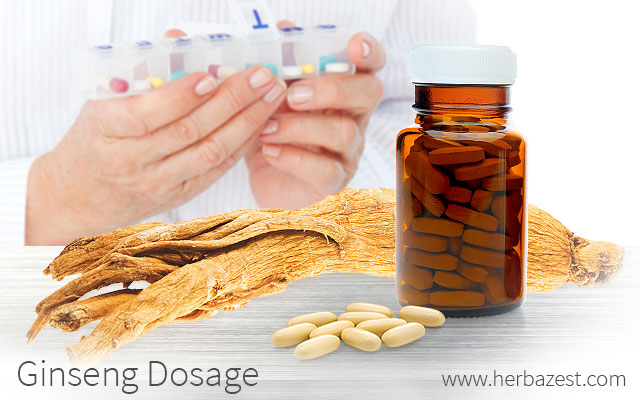While ginseng is a very safe herb, consumption must be very carefully regulated. When the herb is consumed in excess, people can experience nausea, diarrhea, insomnia, and changes in blood pressure. The adverse effects of ginseng are minor and reversible, though with proper dosage and caution, they are mostly preventable.
Ginseng Dosage for High Blood Pressure
4.5 grams daily. A study published in The American Journal of Chinese Medicine (1998) monitored daily blood pressure patterns in 26 subjects after eight weeks of taking 4.5 g of red ginseng daily. The study found a significant decrease in systolic blood pressure (point of cardiac contraction) and a small decline in diastolic blood pressure (point of cardiac relaxation).
Ginseng Dosage for Diabetes
100 - 200 mg of ginseng daily. A study published in the journal Diabetes Care (1995) tested 36 non-insulin-dependent-diabetic patients and found that the patients who took 100 - 200 mg of ginseng daily for eight weeks showed reduced fasting blood glucose levels and weight, enhanced mood, and improved psychophysical performance.
Ginseng Dosage for Men
1,000 mg daily. A study published in the Asian Journal of Andrology (2007) reported that, after 12 weeks of treatment with 1,000 mg Korean red ginseng, patients with mild or mild-to-moderate erectile dysfunction showed overall improvement.
Ginseng Dosage for Women
Three grams of red ginseng. A study published in the journal Menopause (2012) reported that, after 12 weeks taking three grams of red ginseng daily, a group of women 45 - 60 years old experienced significant relief from general menopause symptoms and a reduced risk for cardiovascular disease.
However, a recommended minimum dose of one to two grams of Korean red ginseng three or four times per day would be enough to reap ginseng benefits for women to treat both menopause symptoms and hormonal imbalances (e.g., polycystic ovary syndrome).
Ginseng Dosage for Stimulating Immunity
100 mg of ginseng extract twice a day. A study published in Drugs under Experimental and Clinical Research (1990) tested 60 healthy volunteers and discovered that the individuals who received a ginseng dosage of 100 mg twice daily over eight weeks displayed improved cellular response to chemical stimulation (chemotaxis) and better cellular absorption of nutrients (phagocytosis), as well as an increase in total lymphocyte count, thus promoting a healthy immune system.
100 mg daily. Another study, also published in Drugs under Experimental and Clinical Research (1996), tested 100 mg of ginger extract over 12 weeks in 227 healthy individuals and found that the individuals who took the ginseng experienced a lower occurrence of influenza and colds, higher antibody count, and higher natural killer cell activity levels.
200 mg of wild ginseng extract twice daily. A study published in the Journal of the American Geriatrics Society (2004) established the efficacy of American ginseng in preventing acute respiratory illness in a group of 198 men and women 81 - 84 years old who took 200 mg of wild ginseng extract for 8 - 12 weeks during the 2000 - 2001 influenza season.
Risks of High Ginseng Dosage
Ginseng is an incredibly safe herb, but just as with any substance, over-consumption poses a health risk. When taking ginseng over a long period of time in high doses, a person can develop dependency. This is referred to as "ginseng abuse syndrome." A person who has become dependent on ginseng could start to develop hypertension, nervousness, sleeplessness, skin rash, diarrhea, confusion, and depression. If a long-term treatment is needed, close attention to dosage is essential, and for every two weeks of usage, a break of two weeks is suggested.
As scientific research indicates, when taken properly, ginseng is a very safe and effective herb. However, be sure you always consult your doctor before starting treatment with ginseng, read the labels before buying any ginseng supplements, and follow the dosage as indicated. Though the dosages above have been successfully used in medical studies, consult your physician about a good dosage for you, especially if a medical condition like diabetes has been diagnosed.
Sources
- Asian Journal of Andrology, Study of the efficacy of Korean Red Ginseng in the treatment of erectile dysfunction, 2007
- Diabetes Care, Ginseng Therapy in Non-Insulin-Dependent Diabetic Patients: Effects on psychophysical performance, glucose homeostasis, serum lipids, serum aminoterminalpropeptide concentration, and body weight, 1995
- Drugs Under Experimental and Clinical Research, Immunomodulatory effects of two extracts of Panax ginseng C.A. Meyer., 1990 | Efficacy and safety of the standardized Ginseng extract G115 for potentiating vaccination against the influenza syndrome and protection against the common cold [corrected], 1996
- Journal of Ginseng Research, Therapeutic Effect of Korean Red Ginseng Extract on Infertility Caused by Polycystic Ovaries, 2011
- Journal of Pharmacopuncture, Intravenous Toxicity Study of Water-soluble Ginseng Pharmacopuncture in SD Rats, 2015
- Journal of the American Geriatrics Society, A placebo-controlled trial of a proprietary extract of North American ginseng (CVT-E002) to prevent acute respiratory illness in institutionalized older adults, 2004
- Menopause, Effects of red ginseng supplementation on menopausal symptoms and cardiovascular risk factors in postmenopausal women: a double-blind randomized controlled trial, 2012
- Public Health Nutrition, Efficacy and safety of ginseng, 2000




